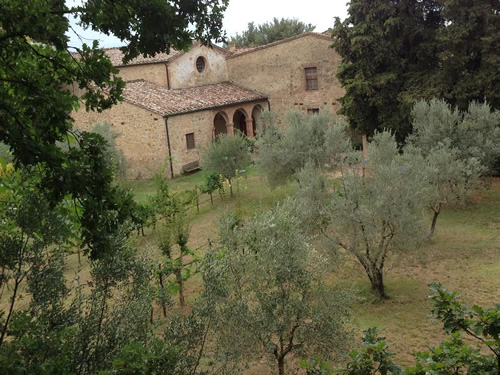Staying in Monasteries and Convents
in Italy
La Dolce Vita
By Ken Harbinson

There are many monasteries and
convents where you can stay across Italy.
From the rocky shores of Lake Como to
the sandy beaches of Sicily, Italy's convents, monasteries,
and religious houses are throwing open their doors to bargain-hunting
tourists. And visitors not only find bargain prices, but
comfort, convenience, and conviviality.
The choices seem endless. Stay in a
large abbey belonging to a famed monastic order set in rural
tranquility. Or choose a small convent in central Rome or
Florence. Many guesthouses are now run by religious orders
like small hotels.
Whatever your choice, you can be sure
your room will be clean, comfortable, and simple. Most have
a private bath. Spacious lounge areas and secluded gardens
and terraces are standard features. Gone are the days of
drafty monastic cells, stone slab beds, and Gregorian chants
echoing down empty corridors.
A continental breakfast ordinarily
comes with the room. In addition, many facilities in Italy — particularly
the guesthouses — provide lunch and dinner for a reasonable
additional charge. Some will even pack a lunch for your
day of roaming the Tuscan hills. Dinner will generally be
family style. Facilities that do not serve food often allow
their guests use of the kitchen.
Peace and Tranquility
Whether or not you are Catholic, these
houses have a peaceful and contemplative atmosphere that
is not to be found in a hotel. You inevitably meet other
guests from countries like Australia and England who discovered
the charms of Italy's religious houses years ago. You can
get acquainted over a glass of wine while reviewing the
day's activities and watching the sunset from the monastery
garden.
A few things to consider when choosing
a religious facility in Italy: First, as mentioned above,
there are true monasteries or convents on the one hand and
religious guesthouses on the other. In the former you are
essentially a houseguest of the religious order, and their
life goes on around you-morning mass, prayers in the chapel,
ordinary domestic chores. It is interesting to be even a
passing interloper in a life so different from your own.
Guesthouses, on the other hand, are
operated by religious orders for the benefit of pilgrims
and travelers. They often will be more attentive to their
guests and more inclined to provide the extras, like packed
lunches.
Larger facilities are likely to attract
groups of pilgrims and visitors more than the smaller, intimate
ones. In any case, reservations should be made early, particularly
during the tourist season. In the off-season, from November
to March or April, many facilities are closed to guests.
And, lamentably, those that stay open may ration the heat.
Then there is the matter of curfews.
If Italian nightlife turns you on, a religious facility
is not your kind of place. Most have a curfew of 10 or 11 — barely
time for late dinner in a nearby restaurant. There is nothing
quite so humbling as straining your fractured Italian to
explain to a censorious nun in her nightrobe just what you
were doing out at all hours of the night.
Closing the Deal
Religious houses have only recently
caught the attention of Americans, due mainly to the publication
of the two books listed below. The biggest challenge for
Americans is making reservations. Judged by my recent experience,
some perseverance may be required.
My effort began with a form letter
in Italian that I copied from the book Bed and Blessings
and sent to nine facilities in Rome and Assisi. (Lodgings
in Italy's Monasteries has a similar form letter.) I received
just two responses from Rome, one saying they had no availability.
Alas, it became necessary to pull out my tattered Italian
phrase book and embark on a tortuous telephone conversation
with a very patient lady whose English was on par with my
Italian. At long last, the happy result was reservations
for an 8-night stay in a magnificent old villa that once
belonged to Assisi nobility, a short walk from the town's
main square. No deposit or credit card was needed. Likewise,
at the end of our stay our credit card wasn't of use. Almost
all the religious houses, it seems, have adopted as their
motto "In God we trust; the rest pay cash."
It was worth it. Our room, which had
been completely refurbished following Assisi's devastating
1997 earthquake, was decorated with antiques. It sported
a newly remodeled bathroom and an oversized window overlooking
the garden and the beautiful Umbrian countryside beyond.
For more than a week this was our home and Assisi was our
hometown. It was, indeed, La Dolce Vita.
Bed and Blessings Resources
The
Guide to Lodging in Italy's Monasteries by
Eileen Barish provides information and numerous pictures
for more than 400 locations.
Good
Night and God Bless: A Guide to Convent & Monastery Accommodation
in Europe: Austria, Czech Republic, Italy includes
comprehensive coverage of Italy.
Bed
and Blessings Italy: A Guide to Convents and Monasteries
Available for Overnight Lodging by
June and Anne Walsh gives detailed information on over
100 religious facilities in Italy.
Interestingly, the books do not totally
overlap.
|
